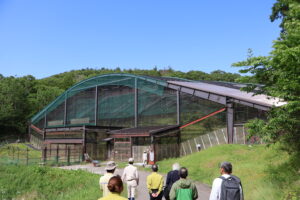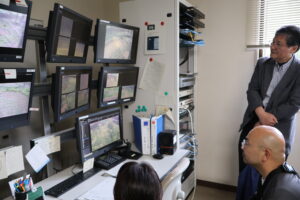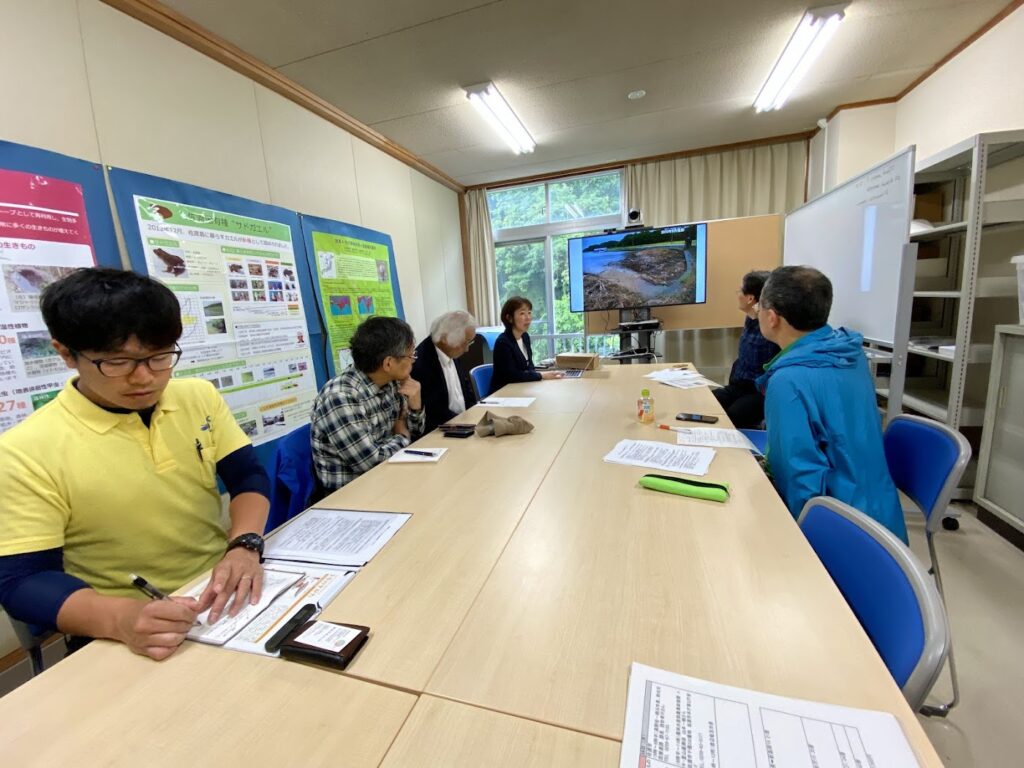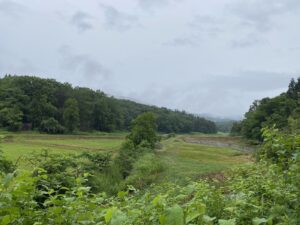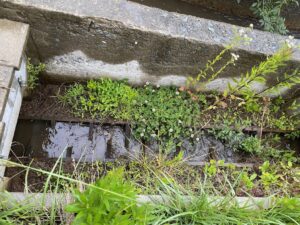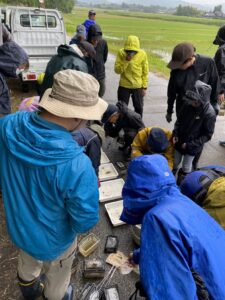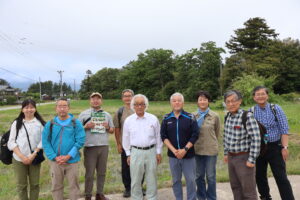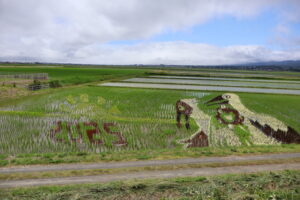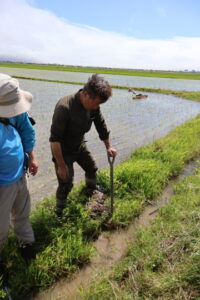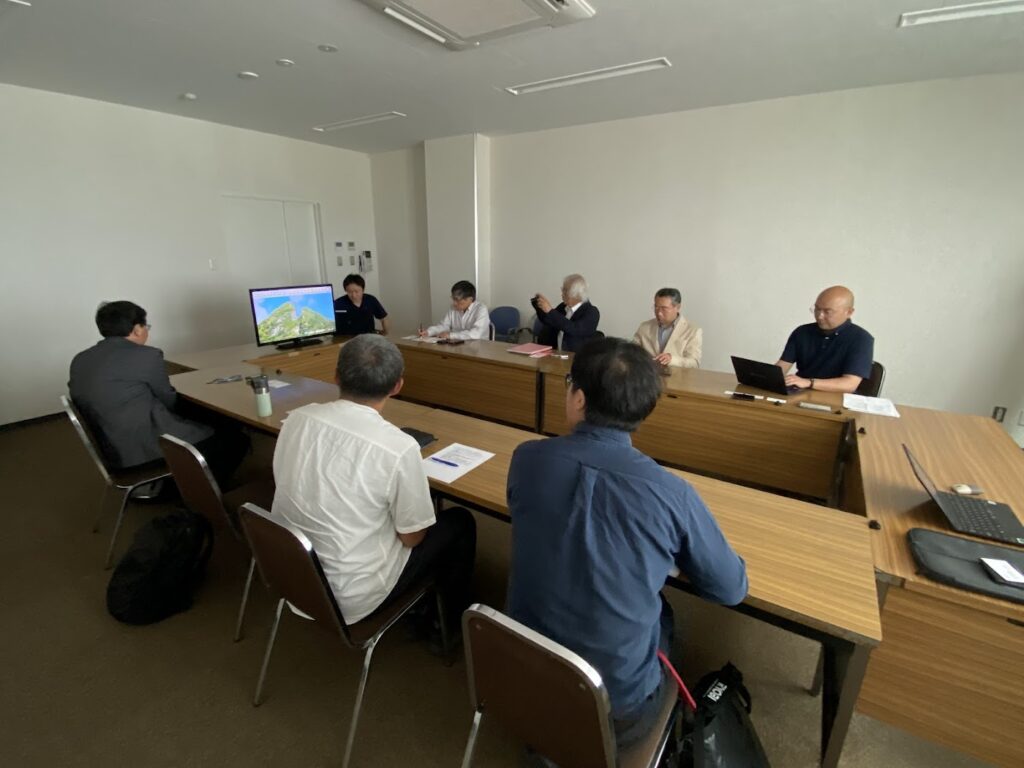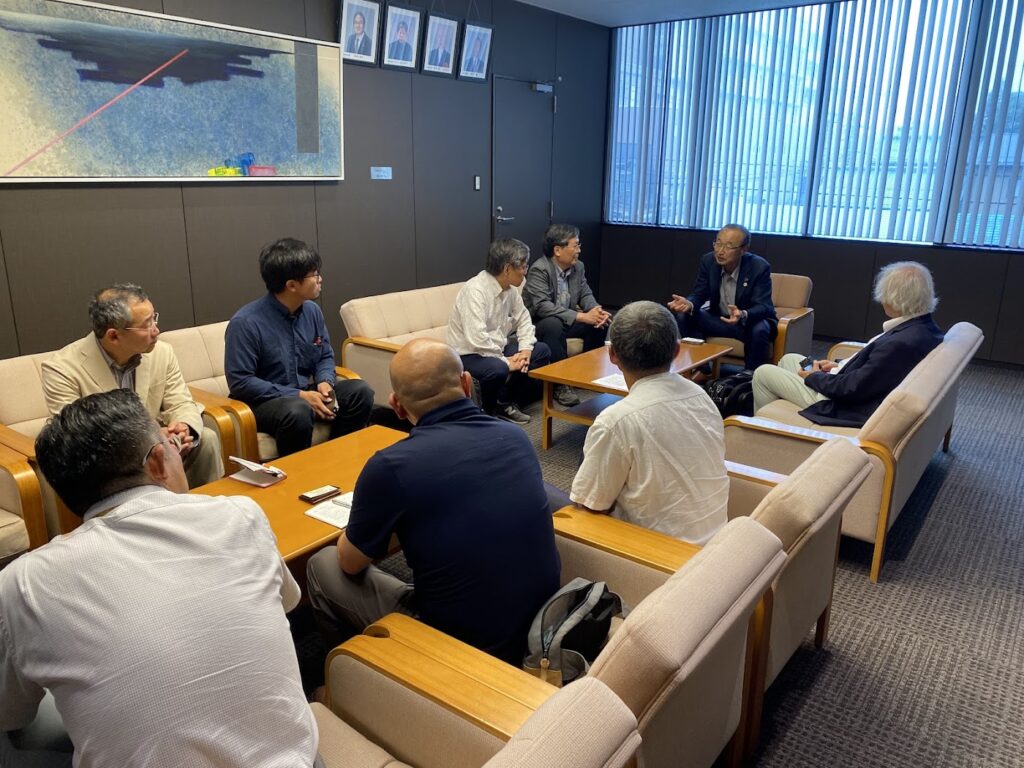OUIK is mapping information for understanding the relationship between regional nature and culture. We have published the booklets “Noto’s Satoyama and Satoumi Maps” and “Kanazawa Nature and Culture Maps”.
We are collecting map information at different levels of prefectures and municipalities in the Hokuriku Region. With a focus on the keywords of biological diversity, cultural diversity and ecosystem service, we are creating tools for learning and information dissemination that meet regional needs.
Collaborative research:アーカイブ
Contribution to the understanding of biocultural diversity and ecosystem service
ごっつぉ草紙 Red data cook book
Establishment of the Noto Biodiversity Society
Five years have passed since “Noto’s Satoyama and Satoumi” was designated as a Globally Important Agricultural Heritage System (GIAHS) by the Food and Agriculture Organization of the United Nations (FAO). OUIK has supported the revision of action plans and monitoring activities after the GIAHS designation.
Biodiversity monitoring activities in Noto, which are carried out in an area that encompasses four cities and five towns, focus on surveys of living creatures conducted independently by municipal governments and private organizations; a unified monitoring system to disseminate information related to biodiversity has not yet been developed.
In response to this situation, “Noto Biodiversity Society” was established by OUIK and Kanazawa University Satoyama-satoumi Project to contribute to Noto GIAHS through monitoring of biodiversity and related activities. The members of this society include people who belong to private organizations that promote the preservation of biodiversity and environmental education in the region, as well as researchers working in laboratories related to biodiversity in Noto.
On January 23, we announced the establishment at a meeting of Noto GIAHS Utilization Executive Committee and Noto GIAHS Promotion Council, in which OUIK participates as an observer. Through surveys of living creatures and related activities, the society will contribute to the preservation and monitoring of biodiversity and dissemination of information, in cooperation with the Council.
白山ユネスコエコパーク協議会の参与メンバーとなりました
OUIK Biocultural Diversity Series #5 Restoring Kinship with Nature through Japanese Gardens -The Challenge to Achieve a Sustainable Commons in Kanazawa
The book introduces unique roles and teachings of Japanese Gardens in Kanazawa City in a relation with human society and it is breaking new ground for Kanazawa’s sustainable future.
Official report of International Forum Series to Commemorate One-Year Anniversary of the 1st Asian Conference on Biocultural Diversity[Electronic Version]
After one year since the 1st Asian Conference on Biocultural Diversity, a series of 2 inernational forums were held to explore the measurements to further promote the Ishikawa Declaration with international initiatives and East Asian partner.
International Forum Series 1 (4/10/2017)
Biocultural diversity & satoyama: Effort towards societies in harmony with nature around the world.
International Forum Series 2 (15/10/2017)
Preserving Biocultural Diversity for Future Generations:Partnarship of East Aisan Countries.
Youth Capacity Building Workshop towards UN’s Sustainable Development Goals
From January 1, 2016 until 2030, United Nations adopted Sustainable Development Goals (SGDs), with 17 goals and 169 targets, to end poverty, protect the planet, and ensure prosperity for all. These goals are applied to all countries and regions, and for the next 15 years they will be the critical tools in the dialogs to solve environmental, economic and social issues. Youth capacity development towards those issues will be essential to ensure the successful achievements of those goals. This Workshop is jointly created by Kanazawa University and United Nations University, and it aims to create the platform for the younger generations to come together and deepen the discussions on SDGs and share the regional issues.
Learning from Sado’s Experience and Considering Noto’s Future: Field Visit Report
Preparations for releasing the crested ibis on the Noto Peninsula in 2026 have been underway since before the earthquake. Following the earthquake and the heavy rain of 2024, the release of these birds is expected to symbolize the region’s recovery of satoyama and satoumi. However, since the situation in Noto still remains difficult, it is important that the project be carried out as a sustainable initiative that meets the wishes and current conditions of the local communities.
The Noto GIAHS (Global Important Agricultural Heritage Systems) Biodiversity Working Group has been developing a mechanism for citizen-participatory surveys of living creatures and implementing them with local residents. From June 13 to 16, 2025, eight members of the working group visited Sado to learn about citizen-participatory surveys of living creatures and efforts to release ibises that have been conducted on the island for many years.
The release of crested ibises began in Sado in 2008, and the population now exceeds 500. Additionally, the “Toki to kurasu sato” certification program, which promotes rice production friendly to living creatures, as well as surveys of living creatures in rice paddies, conducted in collaboration with farmers and children, are implemented as ongoing community-rooted activities. We visited Sado to learn about its efforts and apply them to future sustainable biodiversity conservation and local revitalization in Noto.
Learning from the Sado Ranger Office, Ministry of the Environment, and Sado Japanese Crested Ibis Conservation Center, Niigata Prefecture
Mr. Takashi Kitahashi and Ms. Kanako Ikikame from the Ministry of the Environment, as well as Mr. Takashi Oya and Ms. Kiyoko Inoue from Niigata Prefecture, shared the story of breeding and training of crested ibises prior to their release. At the pre-release training facility, we learned how to acclimate the birds to people and agricultural machinery, as well as the measures taken against predators. We were also shown the remote monitoring system for the breeding cages. It was impressive to see the Ministry of the Environment and Niigata Prefecture work closely together in the same facility which reaffirmed the importance of collaboration among the national government, local governments, universities, and the private sector.
Discussion with Prof. Mitsuyo Toyoda
Professor Mitsuyo Toyoda from Sado Island Center for Ecological Sustainability Office for Community Design, Niigata University, introduced the efforts made on Sado to build consensus among residents and support their activities. Although some fishers from Lake Kamo where the Tenno River flows into, expressed their opposition regarding the nature restoration of the river, through neutral facilitation and careful discussions, they have reached a consensus and are now working together to create reed beds at Lake Kamo and provide environmental education for children. Their story of building a good relationship through consensus building was impressive. We realized the importance of taking a sociological approach, like Professor Toyoda’s, to carry out nature restoration efforts, such as returning the crested ibis to the wild. This approach connects various stakeholders, such as the government and citizens, and carefully picks up the voices of local residents.
Visit to the Tenno River Nature Restoration Site
However, both Sado and Noto are facing labor shortage. There is an urgent need to establish a long-term system for maintaining and managing these natural environments. In depopulated areas, we felt it was important to consider sustainable methods of nature restoration taking into account the maintenance and management needs.
Institute for Sado Ikimonogatari : Learning from Creature Survey Efforts
First, the Institute for Sado Ikimonogatari arranged for us to participate in one of the twice-yearly (June and August) surveys of creatures, which is one of the requirements for “Toki to kurasu sato” certified rice. We participated in the June survey by the Nagaune Producer’s Association, Agricultural Cooperative which has produced certified rice since the inception of the certification system. Despite the drizzle, many residents, including children, gathered to search for living creatures. We easily found loaches, tadpoles, frogs, dragonfly larvae, and many other creatures. From a distance, crested ibises searching for food could be seen in the neighboring rice paddy.
The next day, we interviewed Mr. Katsumi Oi and Dr. Asami Oishi from the institute about their work. They showed us their original illustrated field guide “Illustrated field guide of creatures in Sado paddies” and shared with us their challenges and the living creature surveys they have been conducting with farmers and children. Although they have not been able to make full use of the data they collected on the creatures, they mentioned that they are valuing the experience of getting to know the creatures more than the data itself. They also shared that the institute is facing challenges to continue its activities due to budget cuts and other factors. We were reminded of the need for sustainable organizational management and the difficulties involved.
Learning from Saito Farm’s Practices
Under the guidance of Mr. Shinichiro Saito, we visited the “Toki to kurasu sato” certified rice paddies. We learned about the various efforts they have made to create rice paddies for the crested ibis. These efforts include paddies where rice paddy art has been created for the past nine years, as well as naturally cultivated rice paddies, farmed without any fertilizer or pesticides, where fishways and ditches have been created, and where weeding is being experimented with using a duck robot.
We learn that the “Fuyumizu tambo” (winter-flooded rice paddies), which originated on the Pacific Ocean side of Japan, are not suited to the environment of Sado on the Japan Seaside, which has high levels of precipitation. He mentioned that it is better to keep the water level low, just enough for it to accumulate in the wheel tracks. This benefits both the quality of the rice and the crested ibis, which has short legs. Mr. Saito’s trial-and-error experience will be very helpful for Noto, which has a similar climate to Sado.
Mr. Saito said, “Efforts will not last long if we only provide economic incentives to farmers.” He emphasized the importance of fostering farmers’ interest in living creatures and crested ibises.
Discussion with Sado City Representative
First, we spoke with Mr. Koichiro Takano, former mayor, and Mr. Takayuki Nishimaki, who was in charge of branding and sales channel development for ibis rice at the time. They told us about the background of the decision to release the ibis on Sado and their rice branding efforts. We learnt that the decision to release the crested ibis was made during a time when Sado rice was severely damaged by a heat wave caused by a typhoon. This event also coincided with a significant turning point in the merging of municipalities. It was impressed by what they said about the importance of cooperating with JA (the Japan Agricultural Cooperatives) to realize branded rice in that situation.
Next, Mr. Nagao Nakamura, Mr. Kazuki Yamamoto, and Ms. Mako Igarashi from the Agricultural Policy Division of the Agriculture, Forestry and Fisheries Department introduced the status of certified rice distribution and their collaboration with Coop Deli. They also introduced educational activities for children through the “Sado Kids Living Creatures Survey Team” conducted in cooperation with the Institute for Sado Ikimonogatari. Also, they introduced the efforts being made to provide certified rice in the school lunches.
More than 30 children participate in the “Sado Kids Living Creatures Survey Team” every year. They also introduced a case of a child who participated in this program became a city officer and now actively working in the community. This drew attention to the program as an effort to nurture the next generation and foster a sense of community attachment. Additionally, with regard to securing human resources to serve as instructors for the survey of living creatures, they mentioned about the instructor system implemented more than 10 years ago. Such a system seems effective in developing human resources, as those who participated in it are still active as instructors.
Lastly, we interviewed Mayor Ryugo Watanabe. He introduced the long history of efforts to release the crested ibis and branding of the certified rice. Sado Koshihikari rice is already a popular brand and is in high demand. For this reason, “Toki to kurasu sato” certified rice, which further incorporates farming methods that nurture living creatures, is sometimes sold under the name Sado Koshihikari to meet the demand for the latter. Therefore, in these cases, farmers are not fully compensated for their additional efforts. For this reason, Sado City is now promoting the sale of the certified rice through hometown tax payments. The mayor also emphasized the importance of engaging in careful dialogue and collaborating with a variety of stakeholders, including the JA and farmers.
During this visit to Sado, we experienced the wide range of efforts to return the crested ibis to the wild, as well as the passion of those who support these efforts. We believe that their experience on Sado is very important to us in Noto as we move forward on our journey to release the birds, coexist with nature, and maintain agriculture in the region. As we make progress towards recovery, we hope to work together with local people to think about a better relationship between people and nature.
This study visit was partially supported by the Taisei Corporation Public Trust of Funds for Natural and Historic Environment.
2-Day Noto programme held at OSAKA EXPO
On August 27, 2025, the Osaka-Kansai Expo program, “CONNECTING YOU To NOTO: Learn About Biodiversity (Resilient Creatures) with Noto Elementary School Students!,” took place at the Junior SDGs Camp(Sustainable Dome) venue on the Expo grounds. The Ministry of Environment and the United Nations University Institute for the Advanced Study of Sustainability (UNU-IAS) organized this event.
At the beginning of the program, Sayako Koyama, researcher at the United Nations University Institute for the Advanced Study of Sustainability Operating Unit Ishikawa-Kanazawa (UNU-IAS OUIK), explained the concept of biodiversity by giving examples of creatures from the Noto Peninsula. Participants learned that living things, the environment, and human life are interconnected and mutually supportive. Koyama then discussed the damage caused by last year’s Noto Peninsula earthquake and heavy rains.
Next, fifth- and sixth-grade students from Yanagida Elementary School in Noto Town, Ishikawa Prefecture, presented the results of their surveys on the water quality and wildlife of the Machino River. They had been conducting these surveys since before the disaster. The students shared their observations on post-disaster changes in the ecosystem, wildlife resilience, and the impact of environmental shifts on the food chain.
Following the elementary school student’s presentation, an online exchange session was held with Sakana-kun, who joined from Tokyo. He discussed the fish he observed during his visit to Noto and the challenges that creatures face due to earthquakes, heavy rains, climate change, and environmental issues.
Finally, the children in Osaka venue asked Sakana-kun questions. Sakana-kun drew pictures of fishes and explained their characteristics in detail, which the children listened to with great interest.
The participants had a valuable opportunity to learn about Noto’s wildlife and the situation after the earthquake.
We also received cooperation from the Institute of Noto Satoumi Education and Studies, and the Noto Marine Center in planning this program.
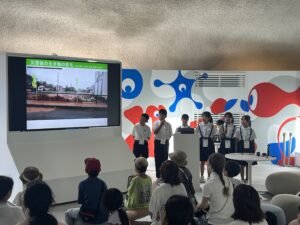
The day 2, on August 28, the session titled “CONNECTIN YOU to NOTO: Learning Disaster Prevention and Recovery from Affected Areas with Noto High School Students!” featured presentations by five first- and second-year Ishikawa Prefectural Nanao High School students.
After Koyama gave a presentation about the livelihoods, traditional culture, and daily life in Noto’s satoyama and satoumi areas, the high school students shared their experiences of the hardships they endured in the region and their feelings during the 2024 Noto Peninsula Earthquake and heavy rains. The students also presented their research on the changes to the local environment after the earthquake and heavy rains. They stated, “We realized that the current state of our environment and way of life is not permanent.” They also discussed the importance of water and shared their experience of going without water for nearly five months. They conveyed the idea that preparedness can minimize damage. Their appeal to learn from disasters and pass that knowledge on to future generations left a strong impression on the participants.
After the presentations, participants ranging from children to adults had group discussion. Inspired by the Noto high school students’ presentations, the participants discussed disaster prevention approaches and daily preparedness in their own regions. Some participants who had experienced the Great Hanshin-Awaji Earthquake shared their memories of that time. These dialogues fostered empathy and learning across generations and regions.
Finally, Shinobu Yamaguchi Director of UNU-IAS reflected on the programme. She stated, “Recent disasters, such as heavy rains and forest fires, are deeply linked to climate change and can occur anywhere in the world—not just in Noto or Japan. That is precisely why bringing together diverse people across generations, positions, and regions to learn together is the key to improving society”.
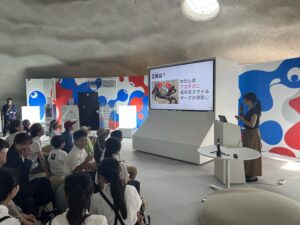
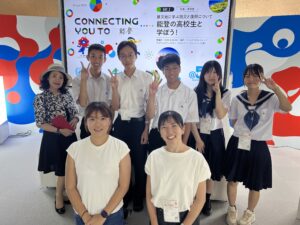
Although centered on the theme of disasters, this program served as a forum for shared reflection that transcended regional boundaries. It connected the past, present, and future, starting with Noto’s experiences. It offered an educational experience worthy of the international stage of the World Expo.


